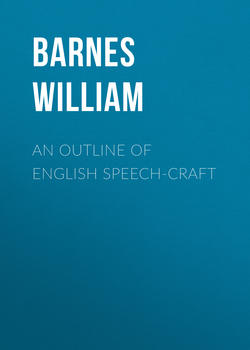Читать книгу An Outline of English Speech-craft - Barnes William - Страница 2
SPEECH-CRAFT
ОглавлениеSpeech-craft (Grammar), called by our Saxon fore-fathers Staef-craeft or Letter-craft, is the knowledge or skill of a speech.
The science of speech in the main, as offmarked from any one speech (Philology), may be called Speech-lore.
Speech is the speaking or bewording of thoughts, and is of sundry kinds of words.
Speech is of breath-sounds with sundry breathings, hard or mild, and breath-pennings, which become words.
(1) A freely open breathing through the throat, unpent by tongue or lips, as in the sounds A, E, O, OO, which are pure voicing. The main ones in English are —
1. ee, in meet.
2. e, in Dorset speech.
3. a, in mate.
4. ea, in earth.
5. a, in father.
6. aw, in awe.
7. o, in bone.
8. oo, in fool.
Besides this open speech-breathing there are two kinds of breath-penning.
(2) The dead breath-penning, as in the sounds AK, AP, AT, AG, AB, AD, which end with a dead penning of the sounding breath.
In AK and AG it is pent in the throat.
In AP and AB with the lips.
In AT and AD on the roof.
K, P, T are hard pennings; G, B, D are mild pennings, the breathing being harder in the former and softer in the latter.
Then there are half-pennings of the sounding breath, which is more or less but not wholly pent, but allowed to flow on as through the nose in
AMH,
ANH,
AM,
AN,
ANG;
as in the half-pent sounds —
half-pent by the tongue and mouth-roof.
For a hard breathing the mark is H, as and, hand; art, hart.
Words are of breath-sounds, and some words are one-sounded, as man; and others are tway-sounded, as manly; and others many-sounded, as unmanliness.
There is word-strain and speech-strain.
The high word-strain (accent) is the rising or strengthening of the voice on one sound of a word, as man´ly.
The high speech-strain (emphasis) is the rising or strengthening of the voice on a word of a thought-wording.
The voice may both rise and fall on the same sounds, as nō.
In English and its Teutonic sister speeches the strain keeps on the root or stem-word, as man, man´ly, man´liness; though in clustered words, with their first breath-sounds the same, the strain may shift for the sake of clearness, as ‘Give me the tea´pot’ – the teakettle is given, and thereupon the bidder may say ‘the teaPOT´,’ not the teaKETTLE.
In Greek the accent shifts in word-building, and likes mainly to settle at about two times or short breath-sounds from the end of the word; and in Welsh it settles mostly on the last breath-sound but one, as eis´tedd, a sitting; eistedd´fod, a sitting-stead; eisteddfod´an, sitting-steads, or bardic sessions.
Besides the word-strain (accent) and the speech-strain (emphasis), there is a speech-tuning (modulation) of the voice (voice-winding), which winds up or down with sundry feelings of the mind, and with question and answers and changes of the matter of speech.
Things may be matterly (concrete) or bodies of matter, as a man, a tree, a stone; or
Things may be unmatterly (abstract), not bodies of matter, as faith, hope, love, shape, speed, emptiness.
It is not altogether good that a matterly and unmatterly thing should be named by the very same word, as youth, a young man, and youth, youngness.
